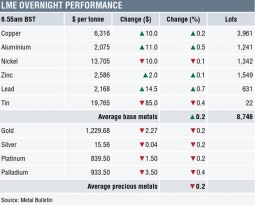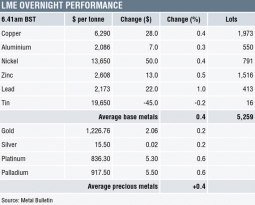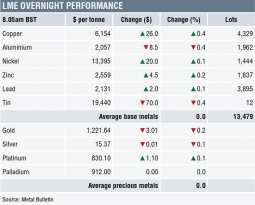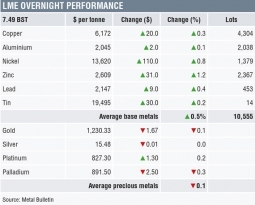Mining investors in the Democratic Republic of Congo (DRC) are united in their desire to fight the country’s new mining code, and could take legal action if they fail to reach a mutually-agreeable solution, according to the chief executive officer of Randgold Resources.
“It’s good for Africa to mobilize investors and for us to reflect on how we find a way with the DRC government – and other governments – to plot a route that will benefit everyone, because ultimately that’s got to happen, otherwise the money leaves and the conflict continues,” he said.
“I’ve got no doubt we’ll find a solution – the question is, do we have to go through a lot of anguish and crises to get to that end result, or are we going to sit down like grown-ups and work out a way with some independent facilitation, perhaps?” he added.
Randgold is already engaging at the highest level with the government of the DRC to head off the enactment of a new mining code, which the company believes will severely limit the growth of the mining industry as well as the country’s own economic prospects. The new code was passed by both houses of parliament last week but still has to be signed by the president before it becomes law.
Among other things, the new code would scrap the 10-year stability clause enshrined in the 2002 code, which was the basis on which Randgold and other mining companies invested in the DRC. Randgold operates the Kibali gold mine in the DRC, a significant project that produced 596,225 oz in 2017.
“There are very few examples where you’ve seen such a unilateral, aggressive change in the mining legislation as you have seen in the DRC these last few weeks. The only other time we saw it was in South Africa post-apartheid, and that was a unique situation that you could get your head around in some form,” Bristow said.
Bristow has said he is prepared to take legal action if no recourse is found.
Another DRC investor, Ivanhoe Mines chairman Robert Friedland, said this week that the company is also working with the government but that there “remains the distinct possibility of unified, industry-led actions if the proposed changes do become law.”
Other large miners active in the DRC include Glencore and CMOC International.
New mining code
Despite the previous code being the most aggressive fiscal code in Africa, the new one is even more draconian, according to Bristow.
“When you run a model on the code for a new investor and do a comparison with it for a standard copper or gold mine, the old code resulted in 65% of revenues after capital redemption arriving in the state treasury. The new code results in 100%,” he said.
“It’s a strange logic to think people will invest in a country to get no returns,” he added.
A key metric required to return to a more stable situation in the DRC, as well as within the industry in general, is to pace the exploitation of a country’s natural resources so that the entire resource can be delivered profitably, Bristow said.
“A lot of people don’t appreciate that taxes are the key driver – particularly royalties, the ability to do business and the infrastructure cost – that set the hurdle of the grade that makes a profit. So no one ever stops and says, ‘How do we as a nation or industry address that under-riding cost structure that allows us to mine for a longer period of time?’” Bristow said.
“We’re in a cycle that we see evidence particularly of in Africa right now, where everyone is trying to make more – investors want more because they’re so scared of the risk in Africa because everyone changes their mind in an almost fluid way; governments want to make more money because they don’t feel that they’re making enough; and so the net result is that the product is a force of high grading. So you high grade a national asset and then you wonder why suddenly in the future there is nothing there,” he added.
A lot of this is the result of short-termism, he noted, which has created a situation where miners manage a business for the long term, but shareholders and politicians seek instant gratification.
“Politicians are supposed to be managing the national asset for the benefit of generations rather than today or tomorrow or against a particular market cycle,” Bristow said during the interview.
Stability versus short-termism
Stability is essential for investors, Bristow noted, although there are sometimes occasions when private negotiations over specific issues take place.
“Ultimately an investor wants clear legislation that allows it to commit significant amounts of money – in our case $2.5 billion – and be comfortable about being able to perform against the code. When there are any disagreements, you can go and seek internal reflection and find a solution, which we did many times,” he said.
“Again, there are a few other big investors, including Glencore, who are also under the code. But given the history of the DRC there’s a lot of investment that was done before the code or around the code’s negotiation, in a sort of [joint venture] JV agreement, directly between the investor and the state or in a tripartite investment structure with Gecamines, the parastatal and the state,” Bristow told Metal Bulletin during the on-stage interview.
“Those negotiations are not in public documents, and those are the agreements that were revisited a couple of times, twice, and were changed in favor of the government. The industry engaged in that because right in the beginning, the desperation [from the DRC’s government] to attract investment resulted in some overly dovish deals in favor of the investor relative to the state. Those future revisits resulted in a hardening of the state’s benefits,” he added.
Likening the new code to changing the rules in the middle of a world cup football match, Bristow said a set of regulations was critical for all parties.
“Every time we tend to make big strides forward, we then go and get seduced by that temptation to harvest everything today. That is extremely damaging, and comes back to short-termism,” he said.
“It’s a criticism I would levy at the political structures in some countries, but equally at the industry,” he added.
The post Mining Indaba 2018: Miners united in fight against planned DRC mining code, says Randgold CEO appeared first on The Bullion Desk.
Read More
Source: Bullion Desk News








